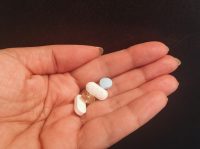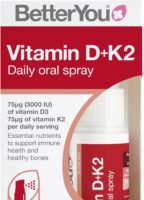
Vitamin D Benefits everyone’s health young and old. Vitamin D has multiple benefits and I have been a massive advocate of Vitamin D for many years due to my autoimmune family. Further strengthened when asked to write for the New Scientist on the tragic case of a murder trial.…
So lets dive in to why you and your family need Vitamin D today…..
It has been known for many years that Vitamin D is important for the following reasons:
- Vitamin D helps our body absorb calcium and phosphate, lowering the risk of tooth decay, cavities, and gum disease as well as ensuring our bones are flexible and strong.
- Vitamin D support the immune system which allows our body to fight off harmful bacteria and viruses.
- Vitamin D helps to strengthen muscles.
Excitingly there is more to vitamin D than it was originally believed…..but before we get into that lets cover the basics….
Low levels of Vitamin D
It is important to be aware that nearly half of the population have low blood levels of Vitamin D during winter months. This is especially low from January through to April/May when any summer sunshine stores you may have gained the previous summer are truly depleted. Those living in latitudes above ∼35° are significantly affected.
In addition to depleted stores, many more people than ever have low levels of vitamin D due to changes in our lifestyles, less time outdoors, and the use of sunscreens. The elderly or those who are housebound are at very high risk all year round. Dark skinned people are also at risk.
Further risk has been found in people who are obese, pregnant or a child due to either a lack of availability as Vitamin D is locked away in high fat stores or due to an increased need for development and growth in childhood and pregnancy.
What are the Symptoms of a low vitamin D?
The following symptoms can be common in those with Vitamin D deficiency:
Fatigue
Not sleeping well
Bone pain or achiness
Depression or feelings of sadness
Hair loss
Muscle weakness
Loss of appetite
Getting sick more easily
What does vitamin D do for you?
Tonnes!!! Interestingly Vitamin D is actually a steroid hormone but also known as a fat-soluble vitamin. This helps the body absorb and retain calcium and phosphorus; essential for building bone.
How does Vitamin D work as a hormone?
The body synthesizes Vitamin D after you have been exposed to the sun. It is then activated by the liver and kidneys. This activated form acts like a hormone to regulate calcium metabolism around the body.
Vitamin D Benefits
Cancer
-
Exciting studies are now showing that vitamin D can reduce cancer cell growth, help control infections and reduce inflammation by stimulating the production of T-cells.
-
These T cells help our bodies respond correctly to fight infections, including viruses, bacteria and fungus. These infections are responsible for various types of illnesses, including the common cold, and flu, Strep A and similar community-wide diseases.
-
Vitamin D also aids in the repair and regeneration of cells, stimulate the death of cells that have been damaged by cancer, and lower the formation of blood vessels in tumours.
Mood
-
Vitamin D boosts your mood. Studies suggest that the decreased levels of Vitamin D3 may impact the levels of serotonin in the brain, this is a hormone that regulates the mood. By enjoining some safe sun each summer and, if in the Northern hemispheres taking a Vitamin D3 supplement in the winter, you could see a significant boost in your mood.
Weight Loss
-
Vitamin D can aid in weight loss. The chemical influence of Vitamin D is on serotonin, the “feel-good” hormone. This is known to assist appetite, sleep, mood, and stress levels. The connection to weight loss is believed that with sufficient levels of Vitamin D you are more likely to be motivated and have the energy to make the changes both mentally and physically to stay fit and healthy at a safe weight.
Rheumatoid Arhtritis
-
Vitamin D can lower the risk of rheumatoid arthritis. One of Vitamin D benefits is to help maintain the immune system and ensure that it is working correctly. A deficiency in Vitamin D could therefore increase the risk of developing rheumatoid arthritis as your immune system is more susceptible to attack.
Type 2 Diabetes
-
Vitamin D lowers the risk of type 2 diabetes. Not getting enough sunlight can reduce the secretion of insulin from the pancreas, which can create resistance to insulin and affect how the body responds to glucose. Sufficient vitamin D can help lower levels of cortisol. This is a stress hormone produced in the adrenal glands. Cortisol assists in the body’s response to stress. Prolonged high levels of cortisol can lead to increased abdominal fat. This is linked to several health conditions including diabetes type 2.
Blood Pressure
-
Vitamin D can help lower blood pressure. a large genetic study that involved more than 150,000 people revealed that low levels of Vitamin D can cause hypertension. In this study, those who had the highest levels of Vitamin D had lower blood pressure. It was found that a 10% increase in Vitamin D led to a 10 % reduction in high blood pressure.
Heart Disease
-
Vitamin D might reduce the risk of heart disease. Several studies have indicated that a deficiency in Vitamin D is a risk factor for developing high blood pressure, heart disease, congestive heart failure, peripheral arterial disease, strokes, and heart attack.

What causes vitamin D to drop other than sunshine?
Vitamin D deficiency as mention is most commonly caused by a lack of exposure to sunlight. However some medical disorders can also cause Vitamin D deficiency.
The most common causes after sunlight is a poor diet, medications and certain disorders. Cystic fibrosis, Crohn’s disease and Coeliac disease are conditions that can prevent your intestines from adequately absorbing enough vitamin D through diet and even supplements, especially if the condition is untreated. Liver and Kidney diseases also reduce absorption due to the action of how vitamin D is made.
I myself have a genetic issue that involves my Vitamin D receptor being only 50% effective in transporting Vitamin D around my body so my levels were dangerously low when checked. I ate all the right foods, but had no sunshine or supplements. This deficiency definitely contributed to my autoimmune condition Hashimotos which you can read more about here.
What happens if you have low vitamin D?
Vitamin D deficiency can cause your bones to become thin, brittle or misshapen – rickets.
Rickets, is a bone disease from the Victorian times, that had diminished, is now increasing significantly.
This leads to bow legs and short height, if prolonged it results in adults as osteomalacia.
- fragile breakable bones
- permanent bone irregularities
- heart problems
- difficult labour
- seizures.
- pneumonia.
- lifelong disability.

How much D vitamin should I take daily?

How can I get vitamin D naturally?
-
Enjoy some sunlight – safely. Vitamin D is know as “the sunshine vitamin” the sun is one of the best sources of this nutrient. Those in Northern Hemispheres as mentioned are at risk. Those with dark skin living in these countries are at further increased risk as it takes longer for Vitamin D to be absorbed in darker skin as the pigment (melanin) in dark skin doesn’t initiate synthesis thus not allowing the skin to absorb as much UV radiation.
-
Consume fatty fish and seafood – A 200g serve of fresh salmon will meet those requirements – picking wild over farmed increases this further. Not only does oily fish provide fat soluble Vitamin D but excellent omega 3 fatty acids too!
-
Eat more mushrooms – Shitake mushrooms are highly concentrated – ideally leave your mushrooms out in the sunlight as this increases their ability to absorb the necessary UV light to enhance Vitamin D concentration.
-
Include egg yolks in your diet -2 egg yolks contain roughly 70iu – useful to add in as a regular boost
-
Take a supplement – Vitamin D3 can be purchased in various amounts in multiple outlets and online. I recommend to my patients the following Vitamin D due to the ingredients and concentration. If you are vegan this is the one I also recommend Vegan Vitamin D The addition of Vitamin K2 is also important to assist depositing calcium where it is needed see below for further details. Monitoring is always recommended and taking breaks to avoid toxicity.
Try a UV lamp -Narrowband UVB (NB-UVB) is an effective method of stimulating vitamin D production these can help keep your vitamin D levels up when sunshine is not an option, and may even be preferred among individuals who do not tolerate the sun or oral supplementation. Those with digestive conditions like cystic fibrosis or on certain medications that may inhibit absorption.
How does vitamin D make you feel?
Does vitamin D make you sleepy?
What food has the most vitamin D?
Is There a Difference Between Vitamin D3 and Vitamin D2 Supplements?
The effects of vitamin D2 and D3 supplements on blood levels using a meta-analysis of randomised controlled trials found that D3 supplements tended to raise blood concentrations of the vitamin more and for longer than D2. Vitamin D3 is the preferred form as it is naturally produced in the body and found in most foods that naturally contain the vitamin.

Can you take too much D vitamin?
Vitamin D benefits overall….
Vitamin K2
Vitamin K2 prevents calcium from hardening arteries, aiding cardiovascular health and improving Insulin Sensitivity. These 2 vitamins together may improve insulin metabolism, benefiting those with metabolic disorders.
Does any of this resonate with you?
I do hope you have found this helpful – and if so what tip from today’s post are you going to consider?
Either way do let me know by leaving a comment.. or maybe you have a tip you would like to share that I haven’t mentioned?……..
If so you can leave a comment on our facebook page or YouTube Channel
For more information go to Vitamin D: The “sunshine” vitamin (icwb.com), Vitamin D – NHS (www.nhs.uk)
If you are unsure of how to change your eating habits, or need help optimising the foods you eat please do contact us. We would love to help you or your family and friends with any nutrition related queries big or small.
In the meantime do please check out our 121Dietitian Shop this has been specially created to assist you in optimising your diet and health.
If you have enjoyed this blog we would love you to share this with your family and friends on your social media channels.
Why not visit our YouTube Channel for more on keeping your health optimal.
How can a Dietitian help
- Book a consultation via our Online Portal
- About Gillian Killiner
- Check out our tailored dietary programmes
Gillian x
Trustindex verifies that the original source of the review is Google. I cannot recommend Gillian enough. I got in touch after struggling to lose weight due to PCOS and suffering from IBS. Thanks to Gillian, my IBS symptoms have massively reduced, and I have been able to lose a significant amount of weight. Her warmth makes you feel instantly comfortable and at ease. Gillian’s help and expertise is second to none, and she is always on hand to answer any questions. I am throughly enjoying the plan Gillian created for me and have found it easy to integrate into my everyday life. I am so grateful for the positive impact her plan has had on me.Trustindex verifies that the original source of the review is Google. Gillian is the greatest. She is compassionate and professional, really helped me to understand my body’s function and how to best support it. Her advice has changed my life.Trustindex verifies that the original source of the review is Google. I would highly recommend Gillian. Her advice and guidance has been a game changer for me. With so much conflicting and confusing advice on healthy eating, using a professional nutritionalist is a must.Trustindex verifies that the original source of the review is Google. I could not recommend Gillian enough over the last 3 months - she has turned my life around! I was referred to Gillian by my gastro consultant due to suffering from ibs, gastritis and hormonal issues for nearly 10 years. Gillian was very understanding and approachable throughout my time spent with her. Gillian discussed my health, lifestyle and eating habits thoroughly. She advised an individualised blood check for underlying issues, educated me on supplements and provided numerous information to help aid my recovery. The low foodmap programme I have been following is achievable and can be adapted to anyones lifestyle. As I am a vegetarian I thought this process may be difficult however Gillian reassured me that this would be no issue. She supplied personalised shopping lists, recipes and alternative foods to help heal my gut and overall health. Continual support from Gillian was on hand via email when required. I seen improvements in my symptoms within only weeks of starting the programme and was overwhelmed by the success due to suffering for years! I have been spreading the word about Gillian's brilliant work and will continue to do so! Thank you again for all your help!Trustindex verifies that the original source of the review is Google. Strongly recommended. There are not many professionals that can totally change you life for the better but this one one if you follow the advice given.Trustindex verifies that the original source of the review is Google. For 30 years I have suffered with IBS D and have been unable to find the right specific help. I was introduced to 121 Dietician about 6 weeks ago and like all other services out there I was sceptical. First up was a consultation online which was great considering the many issues I was having going to places. Gillian listened very attentively and understood the many problems I was having. Gillian decided to introduce me to the Low FODMAP diet. Starting out she provided everything (information, shopping lists, recipes etc) to get started. Through the course of the first 6 weeks Gillian was available to answer any questions or concerns. Following the first 6 weeks I'm very happy to say that all the many problems associated with IBS have gone and I'm starting to live a normal life without any stage fright when out and about. The next 8 weeks will be the reintroduction stage but based on the knowledge from Gillian in the initial stage I'm very confident that at the end I will have full understanding of all my triggers. I can't recommend this service enough as most importantly after 30 years of severe symptoms I once again feel healthy and happy. This is a must if you suffer continually from this horrendous condition. I would be confident that this will help anyone who has IBS. For me this was the best money ever spent and I can't thank Gillian enough for the difference she has made. Roy DornanTrustindex verifies that the original source of the review is Google. Helped solve stomach issues, had previous been to several people but this was the first dietary intervention that workedTrustindex verifies that the original source of the review is Google. After over 10 years of eating quite poorly, Gillian has completely changed my approach to food. After a consultation and review of my diet, she provided me with a list of easy and quick recipes that are packed full of nutrition. She takes into consideration your lifestyle as well which I really appreciated too. I now have much more energy and actually enjoy preparing meals now, something I never did before. I honestly cannot recommend her enough. Thankyou! :-)Trustindex verifies that the original source of the review is Google. The overall experience was a very positive one. Gillian certainly had the expertise and people skills to help evaluate and treat my daughters gut issues. The progress was quite instantaneous and over time has made a huge difference to her everyday life. Thanks to Gillian for her work which came at the end of many doctor consultations. In hindsight Gillian should have been the first port of call.Trustindex verifies that the original source of the review is Google. Gillian is great and her program was just perfect. All the meals were delicious and I always felt satisfied which made it very easy to follow. I would highly recommend, especially the 121 sports program.
[instagram-feed]
Reference:
1) http://www.vitamindcouncil.org/about-vitamin-d/how-do-i-get-the-d-my-body-needs/
2) http://www.webmd.com/food-recipes/features/vitamin-d-deficiency-symptoms-causes
3) http://www.dailymail.co.uk/health/article-2272066/The-vitamin- epidemic-half-Britons-deficient-D- putting-health-risk.html
Links included in this description might be Amazon affiliate links. If you purchase a product or service with the links that I provide I may receive a small commission.


